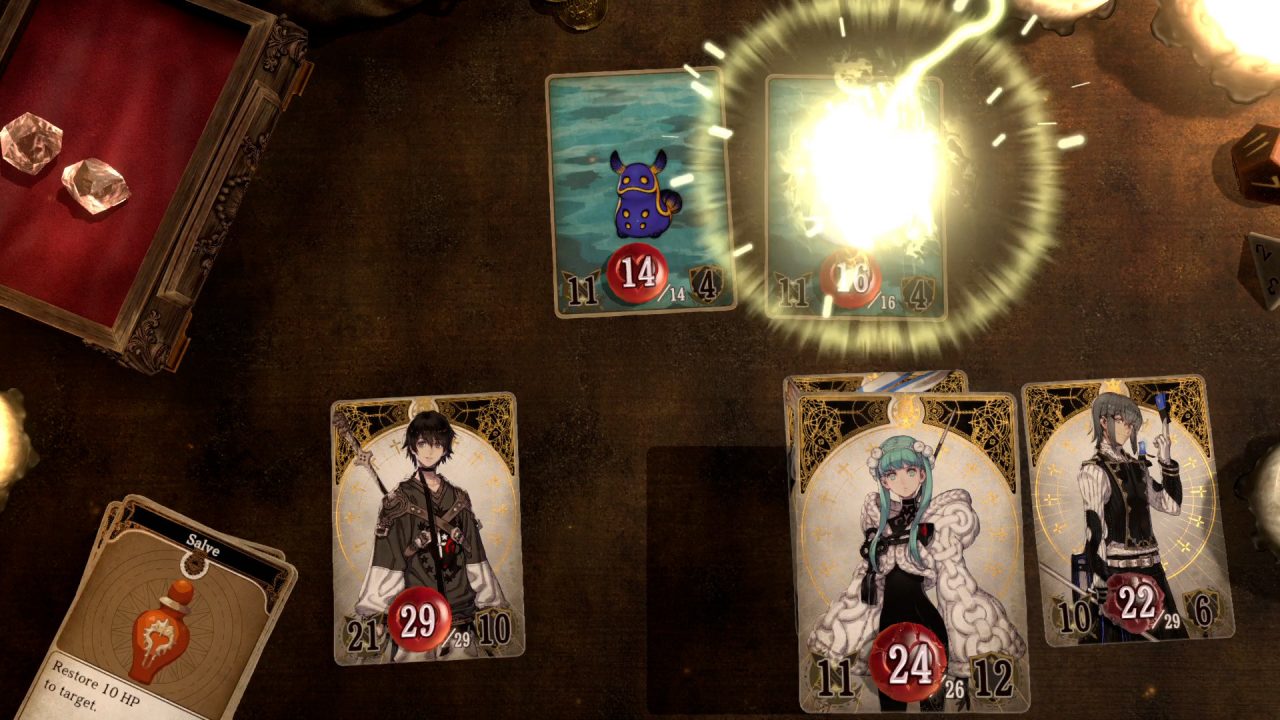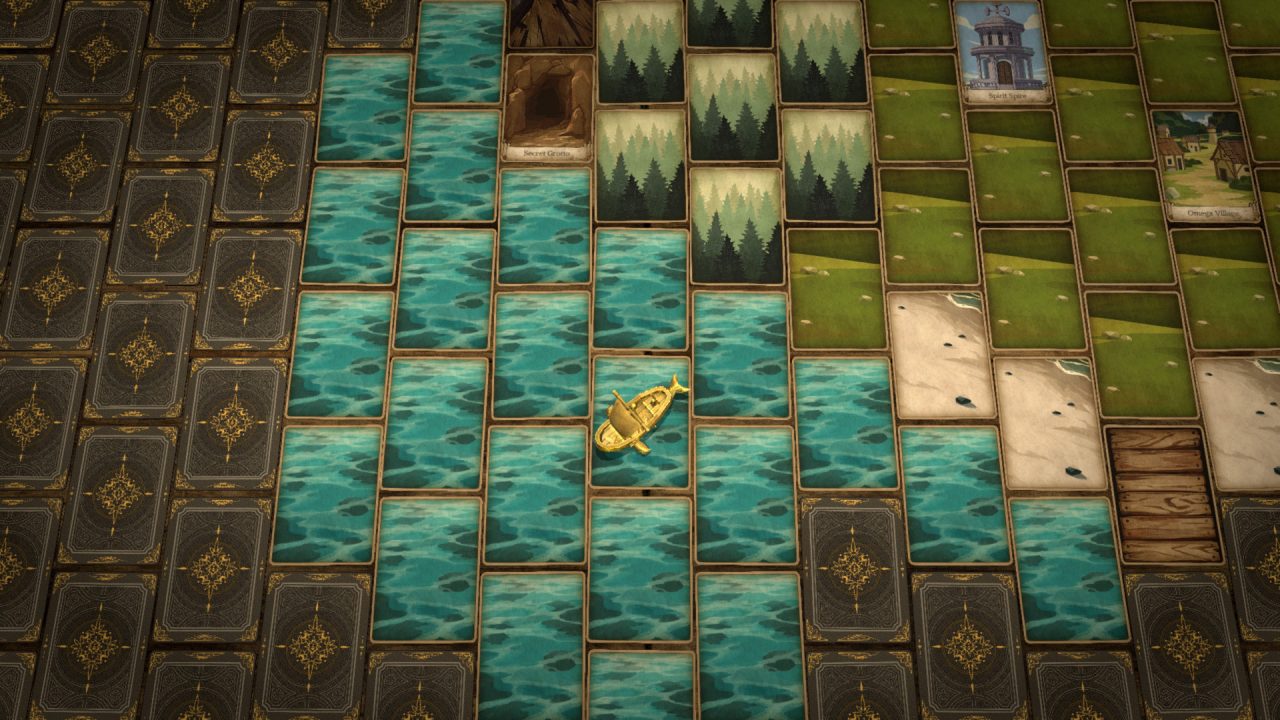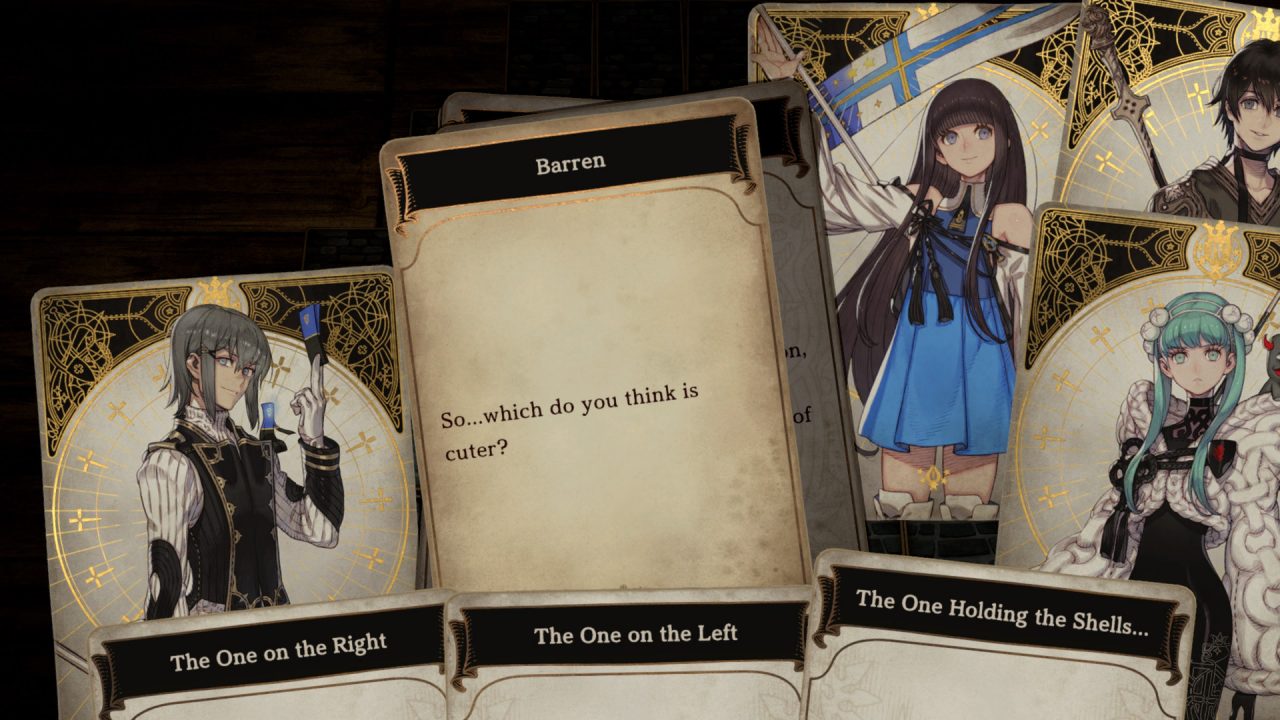Yoko Taro moves quickly, and there’s already a second game in the Voice of Cards series. According to our own Cory Tischbein, the first installment, The Isle Dragon Roars, was an ambitious experiment, though the unique style was only a cover for an overly familiar JRPG. So does the second episode, The Forsaken Maiden, hold water, or is the series already too weathered and worn to withstand another voyage?
The Forsaken Maiden explores yet another well-worn standard in the same world as the first game but with a stand-alone story. If you’ve ever played a JRPG, you’re probably familiar with the tale of a young woman tasked with sacrificing herself to save the world. But in this case, the goal seemingly isn’t to add another one of those stories to the vast sea of them. The Forsaken Maiden takes a deep dive into the trope with a layered narrative, and scope minimized to a local scale. For this maiden, Laty, only the fate of the aptly named Omega Isle rests on her rather than that of the entire world. Despite a focus on exploration, you’re not circumnavigating the globe, and your travels are instead confined to a small group of islands.
But this is not a swashbuckling yarn of bombastic heroes seeking out adventure. The Forsaken Maiden is a much quieter, more introspective tale. The nautical theme goes well with a calm, pre-apocalyptic story of a small village’s slow, inevitable decline. Playing The Forsaken Maiden has a soothing effect akin to watching a gentle thunderstorm draped in a blanket with a warm cup of tea and a book. Considering your main characters’ elements are wind and lightning, they even provide mood-appropriate sound effects. This could have been (and maybe is) a prequel to NieR, as the mix of melancholy spirit and cheeky humor are in line with Taro’s main series.

Any novelty left over from the first game — considering every element is represented by cards — almost immediately dissolves in The Forsaken Maiden. The charm of a world made of beautifully illustrated playing cards again gives way to another conventional JRPG, but tabletop RPGs and board games are other hobbies of mine, so the presentation brought home a little piece of the feeling of playing those types of games. At a glance, the game world looks similar to a Dungeons & Dragons map, and moving through dungeons card by card is reminiscent of old-school dungeon-crawler video games. I accidentally turned off the narrator’s voiceover at first and didn’t realize it until I was a few hours in. Though he isn’t bad, the silence and the soothing music fit the melancholy tone better. I could envision Grandpa Taro telling me a story sitting in front of a crackling fireplace (even though he isn’t that much older than me). If you ever wanted to play D&D with Yoko Taro, this is probably the closest you’ll ever get.
Your party consists of several main characters who stick with you for your entire voyage, with some additional pairs of characters who temporarily join your group along the way. Much of the narrative is broken down into smaller, primarily separate stories that still feel complete on their own, where you play more of a guest role. You have control over the order in which you complete those quests, making the game feel less linear than JRPGs can be. Even smaller are the NPC villager tales you get as you visit various towns; these come with cards of their own that offer thought-provoking two-paragraph snippets about their lives. All of these stories add up to a world that feels appropriately disconnected, where each character is drowning in their individual tragedy. In comparison, the characters who serve as your temporary companions perhaps could have been more fleshed out, but the time you get to spend with them is fleeting yet beautiful, like a song carried away by the ocean breeze.
Flipping cards as you’re exploring in Voice of Cards has a similar calming effect to how some people find coloring books therapeutic. Unfortunately, that outlet doesn’t work for me, as I’m pretty bad at drawing or any sort of crafting with my hands, so it’s more likely to raise my anxiety, but for me, flipping cards felt like its own tiny achievement, and it was satisfying to watch the world fill out as I went. As the story is set in a group of islands, much of your travel is done by boat. This mode of transport provides the spirit of adventure and discovery (lightly reminiscent of Skies of Arcadia), but it also calls to mind tranquil thoughts of watching ocean waves at the beach. Paired with a story that’s oddly comforting in its slow decline towards resigned passivity and a familiar combat system, The Forsaken Maiden is JRPG therapy.

Despite the effective presentation of the story, it’s not without its frustrations. The twists that pop up toward the end are dissatisfying — one is particularly unconvincing and another too predictable. There’s also a thread that delves into a particularly murky, high-profile, real-world political issue, which didn’t need to be broached and feels out of place. Without spoiling too much, it involves “re-education” and loyalty to the state. Because so much of the story is more fragmented, these issues don’t ruin it entirely, but it still causes some damage.
It seems Voice of Cards will be a modular series, and in reference to Cory’s review, the battle mechanics haven’t changed much and don’t need to be re-explained here. But developers Alim have made some improvements, mainly in terms of balancing. Much like the first game, The Forsaken Maiden isn’t particularly challenging, and in fact, I didn’t come close to getting a game over until the endgame. But with the skills that were available to the characters in this game, I often had interesting tactical decisions to make. For example, it wasn’t always obvious what my best move was, and with the gem system, I had to choose between doing a moderate amount of damage with weaker attacks on my current turn or building up to bigger attacks in subsequent turns.
Each battle is its own puzzle, though usually with little tension about the outcome. Occasionally, Happenstance Cards spice up battles, adding a special effect for either a round or the entire encounter, such as resistance to a particular element or all participants becoming poisoned. As they’re randomized, sometimes their effects are unsubstantial, but other times they force you to switch up your usual tactics. Because of this, fights require just enough attention and involvement that if you sleepwalk your way through battles, you could get into trouble. The familiar and relatively simple battle system adequately supports the story and feels like comfort food, but I thought the encounter rate was probably too high, especially toward the end.
The battles themselves also make for fun visual spectacles. Watching the cards representing your heroes slash and flip across the table evokes mental images of an overly enthusiastic dungeon master dynamically moving the cards around with their hands. The motions are creative and imaginative in their minimalism and bring to mind your favorite legendary RPG heroes performing their signature attacks. Status effects are also presented in a visually appealing and thoughtful fashion, especially elemental weaknesses. For instance, if your character is inflicted with lower resistance to lightning or fire, their card will appear to be stained with water or oil, respectively. There are so many small details that it was a joy to see the care the developers put into the presentation. Unfortunately, there is a technical stutter, where transitions from combat back to exploration took so long that I almost feared the game would crash.

As The Forsaken Maiden features themes and moods that set it in the same spiritual space as NieR, the atmospheric music also feels as though it would have been at home in one of those games, which makes sense given the teams’ work on Taro’s previous games. With gentle guitar melodies and somber vocals, it was difficult not to be lulled into sweet slumber while playing. The sound effects accompanying spells in battle are impactful, and the sound of clicking dice waiting for you to roll them adds to the comfy feeling of gathering with friends for some tabletop action.
The quick turnaround of Voice of Cards: The Forsaken Maiden just a few months after the first game and the uniform presentation between the two seems to suggest there will be more to come in the series. While this is not on the level of quality of something like NieR: Automata, The Forsaken Maiden is a strong entry in its own right. Assuming there’s more Voice of Cards to come, I’m looking forward to whatever Yoko Taro has in store next. The sea beckons, won’t you answer its call?


